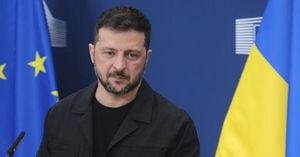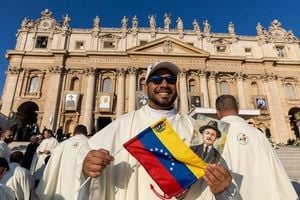Belarus is bracing for presidential elections amid heightened censorship and internet restrictions, raising concerns over access to information and citizens' ability to communicate freely.
On January 25, 2025, just one day before the elections, users across the country reported significant disruptions affecting popular VPN services such as Proton VPN, NordVPN, and TunnelBear. These services are often relied upon by citizens attempting to bypass the government's tight control over internet access. For the first time, even Wikipedia faced temporary unavailability, causing alarm among users attempting to gather information on the electoral process.
Belarusian President Alexander Lukashenko, who has held power since 1994, is preparing for another term amid mounting tensions and skepticism around the legitimacy of the elections. Citizens have expressed frustration over the government's attempts to stifle dissent, with many stating their grievances online. This is particularly concerning for those who lived through the 2020 elections, characterized by mass protests and severe restrictions on internet access, where reports indicated complete shutdowns implemented to quell dissent.
Reports from Freedom House indicate the continued deterioration of internet freedom within Belarus, as the government employs various tactics to maintain its grip on information. According to Felicia Anthonio, #KeepItOn Campaign Manager at Access Now, this isn't merely random interference; she noted, "This is clearly a deliberate tactic to stop people from mobilizing and instill fear" among the populace.
Following the disruptions on January 25, users struggled to access platforms like Twitch, Steam, and Reddit, with Telegram's performance also declining. The Operations and Analytical Center of Belarus had reportedly ordered the restrictions, claiming they were necessary to maintain order during the election. Many citizens believe these actions are aimed at hindering transparency by obstructing communication during a politically sensitive time.
While some VPN services succeeded in maintaining functionality, others experienced significant challenges, sparking outrage across social media platforms. Antonio Cesarano, the Product Lead at Proton VPN, commented on the increased censorship, stating, "Elections are often flashpoints in internet censorship, with increased blocking often undertaken by countries already censoring access to information. The situation is no different in Belarus."
During this period, VPN users reported difficulty connecting to many online resources, exacerbated by the government’s systematic actions. The timing of these restrictions has led many to believe they are not only precautionary but also intentional, targeted to suppress any potential unrest and limit citizens' efforts to coordinate protests.
Although the disruptions were widespread, some platforms remained accessible, noted by hosting providers such as Hoster.by. Users could still access larger news platforms and services, but smaller sites and independent entities faced blockages, raising significant questions about freedom of speech. This targeted approach allowed authorities to limit the reach of alternative narratives, limiting citizens’ resources to receive unbiased information.
Shakirov, the Technical Director of the Russian digital rights advocacy group Roskomsvoboda, highlighted the severe nature of censorship within Belarus, remarking, "Censorship in the country is serious." He also emphasized how authorities have escalated efforts to monitor communications and inspect the digital activities of citizens.
Despite the systematic impairments to internet services, Belarusians have been encouraged to utilize various circumvention tools to navigate potential outages. The plunge of around 170% increase of signups for Proton VPN, which has often been one of the resilient services available, reflects the urgency experienced among citizens leading up to the elections. People are evidently aware of the potential for complete internet shutdowns, similar to those seen during protests following the election events of 2020.
Experts predict varying outcomes based on the public's response and behavior during the elections. “If the elections go smoothly nothing will be blocked beyond what is already blocked,” cautioned Shakirov, adding, “Our forecast is shutdowns only if protests arise.” This makes the government's position clear: they are prepared to act against any signs of discontent or organized opposition, particularly if protests mirror those seen during previous electoral crises.
The reality is grim for the future of internet accessibility and freedom in Belarus. Anthonio from Access Now concluded, "Telcos and internet service providers operating in the country have responsibilities to uphold people's rights and must resist government orders to restrict or cut off access to the internet and digital platforms."
With the elections fast approaching, many are left contemplating how the balance between stability and freedom will play out and wondering whether their voices will be heard or drowned out by disinformation and heavy governmental oversight.



